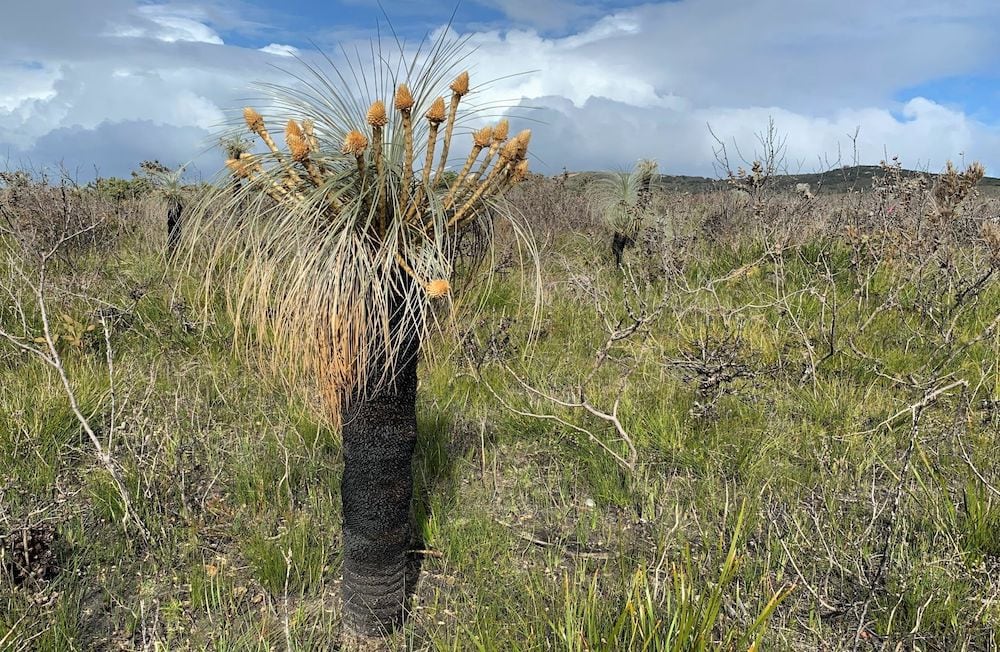TERN, CSIRO and the Australian Government Department of Agriculture, Water and the Environment are developing Australia’s first Monitoring, Evaluation and Research network. The new network is being piloted within the Australian Government’s Regional Land Partnerships program to understand the effectiveness of ecological management activities, such as weed management, and to promote national-scale learning about the recovery of ecosystems after fire.
Australian governments, industry, organisations and communities are investing substantial resources into Natural Resource Management (NRM) programs that aim to manage and restore Australian ecosystems and biodiversity. For example, the Australian Government’s Regional Land Partnerships (RLP) program is a $AUD 450 million investment over five years.
However, a key challenge for these programs is measuring their achievements and using that information for improving subsequent activities and investments to maximise outcomes.
A new approach to measuring effectiveness
To address the challenge of consistently measuring achievements within and across programs, the Monitoring, Evaluation and Research (MER) network is being established as a set of linked, local scale experiments embedded in NRM activities, that can provide learnings about the effectiveness of NRM at local to national scales.
By targeting key ecological questions at national scales, MER networks will assist in facilitating improved outcomes for future NRM projects.
“MER networks allow you to measure whether an ecological intervention, or natural event such as a fire, is improving biodiversity outcomes at a site. They also demonstrate how the outcomes vary across sites and circumstances, for example, when and where they are effective.”
They do this by using consistent protocols to ensure everyone is measuring similar things under the same experimental design at their local sites. When you add it up across all the sites in the network, you’ve got a comparable dataset from across the country.”
Dr Suzanne Prober, CSIRO
New Jarrah Marri forest post-fire MER plots with and without weed treatments. Lake Pleasant View, South Coast NRM, WA. @SouthCoastNRM @MERNetwork @SamNicol16 @BroadhurstLinda @RAMorgain pic.twitter.com/HcpY6plQkg
— Suzanne Prober (@SuzanneProber) August 19, 2021
MER Fire and Weeds Pilot Network
TERN is working with CSIRO, the Australian Government Department of Agriculture, Water and the Environment (DAWE), RLP service providers and Traditional Owners, in developing Australia’s first MER network that investigates the recovery of ecosystems after fire, with a focus on the 2019-2020 bushfire impacts, and the effectiveness of weed management.
The pilot network involves establishing the research infrastructure for the project (i.e., experimental monitoring plots with a consistent experimental design) within areas that have been recently impacted by bushfires or subject to prescribed burning and weed management interventions.
The MER Pilot team and their collaborators in NRM regions across Australia have begun selecting and setting up sites across a range of ecosystem types in Western Australia, South Australia and Queensland. Sites in New South Wales and Victoria will hopefully follow shortly, as COVID-19 lockdown travel restrictions no longer apply.
The team is also developing standard monitoring protocols that will generate consistent data across the range of ecosystems and management scenarios included in the project.
The monitoring protocols have just been trialled for the first time at a Gimlet woodland site in Western Australia and will be rolled out at other sites across Australia. These plots will be used to track post-fire recovery and determine the effectiveness of interventions (i.e., weed management) at the MER network sites.
The network will draw on existing RLP infrastructure and the monitoring expertise of TERN and CSIRO, particularly in bush-fire impacted areas of Australia.
“So far, we have 125 plots marked out across 15 sites, and have selected locations for a further five sites. The October roll-out of monitoring protocols in partnership with Rangelands NRM and the Ngadju rangers was an exciting event for the whole team!
The plots are used to monitor the impact of recent bushfires in Gimlet woodlands, which led to the death of many eucalypts, some more than 300 years old. The fires subsequently led to a flush of native grasses and forbs and nearly doubled the plant diversity compared with the unburnt plots. However, eucalypt recruitment was sparse. Over time, we’ll be able to evaluate whether this recruitment is sufficient to replace the trees that were killed.”
Dr Suzanne Prober, CSIRO
Very first roll out of MER Network post-fire monitoring protocols this week. A mammoth effort by Ngadju rangers with support from Georg Wiehl (CSIRO). @TERN_Aus @Envirogov @SuzanneProber @SamNicol16 @BroadhurstLinda #Ngadju @RangelandsNRM pic.twitter.com/uqVdR8zxyD
— MERNet (@MERNetwork) October 14, 2021
MER Partnerships: a nexus of science policy and practice
Collaboration between researchers, policy-makers and practitioners has been integral to the co-design and co-implementation the MER network pilot project, says TERN’s Dr Nick Gellie.
“The MER Network concept was co-developed by the Australian Government, CSIRO and Griffith University to encourage best practice monitoring nation-wide and help improve NRM decision making. From the beginning of the project, TERN has worked closely with project stakeholders to help design the infrastructure required to tackle the key questions that the network wishes to address, for example, identifying the post-fire ecological effectiveness of NRM interventions.
TERN will continue to play an important role over the next two years in the development of standardised on-ground monitoring protocols, the training of MER Network participants and growing the Network by establishing MER Network plots across Australia.”
Dr Nick Gellie, TERN
@MERNetwork Yawuru rangers and country managers helping to set up MER plots in Corymbia paractia priority ecological community, Broome WA. @TERN_Aus @Envirogov @SuzanneProber @rangelandsnrm @EnviroKimberley pic.twitter.com/aMZb37W0Jy
— Suzanne Prober (@SuzanneProber) August 25, 2021







